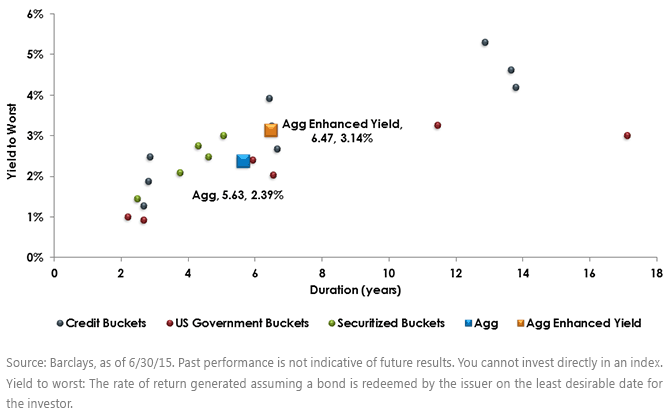AGGY: Looking within the Barclays U.S. Aggregate Index to Enhance Income


 As we show above, the Agg provides a variety of opportunities for income across various sectors and interest rate risk profiles.
• Across the yield curve, debt guaranteed by the U.S. government tends to have the lowest levels of yield per unit of interest rate risk.
• Next, securitized debt or bonds backed by a pool of receivables such as mortgages can provide a modest lift in yield in exchange for the slightly higher probability that the borrower may default.
• Finally, investment-grade credit can provide an additional increase in yield compared to credit risk-free Treasury debt. In our view, many investors may fail to realize that the Agg could provide greater opportunities for return once they take a closer look at the individual components.
However, if investors simply allocated based on yield, the portfolio would be significantly over-weight credit and interest rate risk. In our view, this naïve approach to fixed income does little to enhance an investor’s prospects for return.
Through our approach to the Agg, when a variety of constraints focused on risk management are applied, the output of the Index methodology resulted in a portfolio with an additional 75 basis points (bps) of income potential, while retaining a similar interest rate risk profile to that of the Barclays Agg.1 This incremental yield advantage is typically achieved through increased exposure to corporate and securitized debt and reduced exposure to U.S. Treasury securities. The implementation of relative sector and quality constraints, however, also helps the Index preserve the diversification potential of a broad-based, core fixed income strategy.
There’s an Exchange-Traded Fund for That
With the launch of the WisdomTree Barclays U.S. Aggregate Bond Enhanced Yield Fund (AGGY) on July 9, 2015 WisdomTree packaged this unique approach in an exchange-traded fund (ETF). AGGY is listed on the New York Stock Exchange with a net expense ratio of just 12 bps.2 By searching for income within the investment-grade universe, AGGY could represent a step forward for investors looking to generate greater income potential while broadly retaining the risk characteristics of familiar core fixed income portfolios.
1Source: Barclays, as of 6/30/15. Income potential comparison based on the yield to maturity of the Barclays U.S. Aggregate Index and the Barclays U.S. Aggregate Enhanced Yield Index.
2Gross expense ratio 0.20%. The net expense ratio reflects a contractual waiver of 0.08% through 12/31/16. Ordinary brokerage commissions apply.
As we show above, the Agg provides a variety of opportunities for income across various sectors and interest rate risk profiles.
• Across the yield curve, debt guaranteed by the U.S. government tends to have the lowest levels of yield per unit of interest rate risk.
• Next, securitized debt or bonds backed by a pool of receivables such as mortgages can provide a modest lift in yield in exchange for the slightly higher probability that the borrower may default.
• Finally, investment-grade credit can provide an additional increase in yield compared to credit risk-free Treasury debt. In our view, many investors may fail to realize that the Agg could provide greater opportunities for return once they take a closer look at the individual components.
However, if investors simply allocated based on yield, the portfolio would be significantly over-weight credit and interest rate risk. In our view, this naïve approach to fixed income does little to enhance an investor’s prospects for return.
Through our approach to the Agg, when a variety of constraints focused on risk management are applied, the output of the Index methodology resulted in a portfolio with an additional 75 basis points (bps) of income potential, while retaining a similar interest rate risk profile to that of the Barclays Agg.1 This incremental yield advantage is typically achieved through increased exposure to corporate and securitized debt and reduced exposure to U.S. Treasury securities. The implementation of relative sector and quality constraints, however, also helps the Index preserve the diversification potential of a broad-based, core fixed income strategy.
There’s an Exchange-Traded Fund for That
With the launch of the WisdomTree Barclays U.S. Aggregate Bond Enhanced Yield Fund (AGGY) on July 9, 2015 WisdomTree packaged this unique approach in an exchange-traded fund (ETF). AGGY is listed on the New York Stock Exchange with a net expense ratio of just 12 bps.2 By searching for income within the investment-grade universe, AGGY could represent a step forward for investors looking to generate greater income potential while broadly retaining the risk characteristics of familiar core fixed income portfolios.
1Source: Barclays, as of 6/30/15. Income potential comparison based on the yield to maturity of the Barclays U.S. Aggregate Index and the Barclays U.S. Aggregate Enhanced Yield Index.
2Gross expense ratio 0.20%. The net expense ratio reflects a contractual waiver of 0.08% through 12/31/16. Ordinary brokerage commissions apply.
Important Risks Related to this Article
There are risks associated with investing, including possible loss of principal. Fixed income investments are subject to interest rate risk; their value will normally decline as interest rates rise. Fixed income investments are also subject to credit risk, the risk that the issuer of a bond will fail to pay interest and principal in a timely manner or that negative perceptions of the issuer’s ability to make such payments will cause the price of that bond to decline. Investing in mortgage- and asset-backed securities involves interest rate, credit, valuation, extension and liquidity risks and the risk that payments on the underlying assets are delayed, prepaid, subordinated or defaulted on. Due to the investment strategy of the Fund, it may make higher capital gain distributions than other ETFs. Please read the Fund’s prospectus for specific details regarding the Fund’s risk profile. Barclays Capital Inc. and its affiliates (“Barclays”) are not the issuer or producer of the Funds, and Barclays has no responsibilities, obligations or duties to investors in the Funds. Barclays and the Barclays Indexes are trademarks owned by Barclays Bank PLC and licensed for use by WisdomTree with respect to the WisdomTree Trust as the issuer of the Funds. Barclays’ only relationship to WisdomTree is the licensing of these Barclays Indexes, which are determined, composed and calculated by Barclays without regard to WisdomTree or the Funds. While WisdomTree may for itself execute transaction(s) with Barclays in or relating to these Barclays Indexes in connection with the Funds that investors acquire from WisdomTree, investors in the Funds neither acquire any interest in these Barclays Indexes nor enter into any relationship of any kind whatsoever with Barclays upon making an investment in the Funds. The Funds are not sponsored, endorsed, sold or promoted by Barclays, and Barclays makes no representation or warranty (express or implied) to the owners of the Funds, the Issuer or members of the public regarding the advisability, legality or suitability of the Funds or use of these Barclays Indexes or any data included therein. Barclays shall not be liable in any way to the Issuer, investors or other third parties in respect to the use or accuracy of these Barclays Indexes or any data included therein or in connection with the administration, marketing, purchasing or performance of the Funds.

Rick Harper serves as the Chief Investment Officer, Fixed Income and Model Portfolios at WisdomTree Asset Management, where he oversees the firm’s suite of fixed income and currency exchange-traded funds. He is also a voting member of the WisdomTree Model Portfolio Investment Committee and takes a leading role in the management and oversight of the fixed income model allocations. He plays an active role in risk management and oversight within the firm.
Rick has over 29 years investment experience in strategy and portfolio management positions at prominent investment firms. Prior to joining WisdomTree in 2007, Rick held senior level strategist roles with RBC Dain Rauscher, Bank One Capital Markets, ETF Advisors, and Nuveen Investments. At ETF Advisors, he was the portfolio manager and developer of some of the first fixed income exchange-traded funds. His research has been featured in leading periodicals including the Journal of Portfolio Management and the Journal of Indexes. He graduated from Emory University and earned his MBA at Indiana University.

